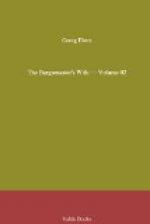This highest part of the house afforded a beautiful prospect; the view was almost as extensive as the one from the top of the citadel, the old Roman tower situated in the midst of Leyden. Like a spider in its web, Wilhelm’s native city lay in the midst of countless streams and canals that intersected the meadows. The red brick masonry of the city wall, with its towers and bastions, washed by a dark strip of water, encircled the pretty place as a diadem surrounds a young girl’s head; and like a chaplet of loosely-bound thorns, forts and redoubts extended in wider, frequently broken circles around the walls. The citizens’ herds of cattle grazed between the defensive fortifications and the city wall, while beside and beyond them appeared villages and hamlets.
On this clear April day, looking towards the north, Haarlem lake was visible, and on the west, beyond the leafy coronals of the Hague woods, must be the downs which nature had reared for the protection of the country against the assaults of the waves. Their long chain of hillocks offered a firmer and more unconquerable resistance to the pressure of the sea, than the earthworks and redoubts of Alfen, Leyderdorp and Valkenburg, the three forts situated close to the banks of the Rhine, presented to hostile armies. The Rhine! Wilhelm gazed down at the shallow, sluggish river, and compared it to a king deposed from his throne, who has lost power and splendor and now kindly endeavors to dispense benefits in little circles with the property that remains. The musician was familiar with the noble, undivided German Rhine; and often followed it in imagination towards the south but more often still his dreams conveyed him with a mighty leap to Lake Lugano, the pearl of the Western Alps, and when he thought of it and the Mediterranean, beheld rising before his mental vision emerald green, azure blue, and golden light; and in such hours all his thoughts were transformed within his breast into harmonies and exquisite music.
And his journey from Lugano to Milan! The conveyance that bore him to Leonardo’s city was plain and overcrowded, but in it he had found Isabella. And Rome, Rome, eternal, never-to-be-forgotten Rome, where so long as we dwell there, we grow out of ourselves, increase in strength and intellectual power, and which makes us wretched with longing when it lies behind us.
By the Tiber Wilhelm had first thoroughly learned what art, his glorious art was; here, near Isabella, a new world had opened to him, but a sharp frost had passed over the blossoms of his heart that had unfolded in Rome, and he knew they were blighted and could bear no fruit—yet to-day he succeeded in recalling her in her youthful beauty, and instead of the lost love, thinking of the kind friend Isabella and dreaming of a sky blue as turquoise, of slender columns and bubbling fountains, olive groves and marble statues, cool churches and gleaming villas, sparkling eyes and fiery wine, magnificent choirs and Isabella’s singing.




